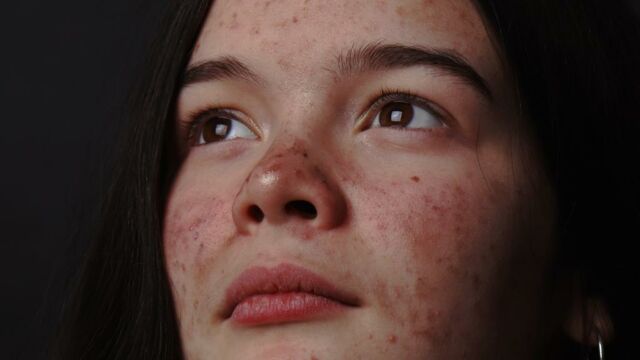Many of us who have suffered through onslaughts of constant hormonal acne breakouts think we’ve tried everything possible to cure it. Whether it’s over the counter spot treatments, cleansers and acids to a range of prescriptions like Adapelene or Tretinoin, none of these solutions seemed to give long term relief from the constant stream of angry, red pimples. However, there’s one superhero acne treatment that you may not have heard of before: Spironolactone.
Discover our latest podcast
Here’s everything you need to know about Spironolactone and how to use it to treat your acne:
What is spironolactone?
There’s a good reason many of us have never heard about Spironolactone before now: treating acne is not this drug’s first purpose. Spironolactone is essentially a diuretic pill, meaning that it helps to drain water from the body. It was initially produced to treat high blood pressure, heart failure and oedema.
But, Spironolactone’s acne-fighting properties have been known by dermatologists for decades. This drug works to treat acne in women by targeting the hormonal factors that could influence breakouts. However, this treatment is not often used in men due to unwanted side effects.
Spironolactone for acne
Spironolactone helps to treat hormonal acne by targeting androgens in the body. Androgens are male hormones (think testosterone) that both men and women need to produce to survive. Excessive androgens can cause glands in the hair follicle to overproduce oil, resulting in clogged pores and acne. To treat this, Spironolactone slows down the productions of androgens in the body and reduces their effects on the skin. Susan Raffy of Susan Raffy Consulting explained:
Testosterone causes the sebaceous glands in our skin to produce more oil and make our skin thicker resulting in increased clogged pores. By blocking the actions of testosterone on our skin, the risk of clogged pores and subsequent acne is reduced.
Due to its androgen inhibiting properties, Spironolactone is the perfect acne treatment for women suffering from hormonal or cystic acne and those dealing with acne resulting from a condition such as Poly Cystic Ovarian Syndrome. Justine Kluk, MD, dermatologist and acne specialist, told Byrdie:
It’s not actually licensed for treating acne in absence of the full syndrome, but consultant dermatologists can prescribe the drug on an off-label basis for women who have a hormonal pattern to their spots and whose acne hasn’t responded to first-line therapies such as prescription creams, antibiotics, and even Accutane.
How to take Spironolactone
Spironolactone is a prescription treatment which means your doctor or dermatologist will be at liberty to decide whether or not this would be a suitable acne medication for you and at what strength.
If you do get a Spironolactone prescription, it may take a few weeks before you start to see fewer hormonal breakouts or less oily skin. Some studies even go as far as to say that the longer a person is on Spironolactone, the better the drug’s effect will be.
The usual length of a Spironolactone course also differs. It’s up to your healthcare professional to determine the length of your course depending on the severity of your acne.
Unlike other acne treatments, Spironolactone is just a pill, to be taken once per day, either with food or without. This means you don’t have to worry about changing up your existing skincare routine. Your doctor or dermatologist may even recommend using Spironolactone in conjunction with other topical acne medications to enhance the efficacy and benefits of the product.
Side effects of Spironolactone
Spironolactone is an excellent off-label acne treatment, but it’s vital that this treatment only be used by women. Due to its effects on male hormones, men who take this medication could develop gynecomastia, which causes swollen breast tissue and tenderness. This medication is also not safe for those who are pregnant. Other side effects of Spironolactone include:
- Increased need for urination
- Irregular periods
- Breast tenderness
- Fatigue
- Headaches
- Dizziness
- Loss of libido
Due to its side effects, Spironolactone is not often used as the first course of action for stubborn acne. But, if you’ve tried everything else and your cysts just won’t budge, then talking to your doctor about Spironolactone may be what you need.















